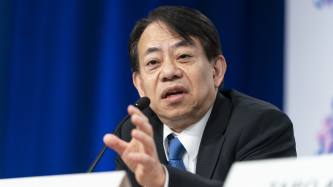Karina Robinson talks to some of Hong Kong’s most influential business leaders about the prospects for sustained recovery and the effect that issues such as Article 23 and mainland China’s growth prospects are having on the economy.
David Li, head of the Bank of East Asia, kindly hosted a delicious lunch for your correspondent in Hong Kong where the discussion ranged far and wide over the future of the Special Administrative Region. Lately, it has coped with major political upheaval and demonstrations, while its economy looks finally to be emerging from five years of treading the recessionary tightrope.
The other guests, most of whom have extensive mainland China operations as well as being based in Hong Kong, were: Christopher Cheng, chairman of textile company WingTai Corporation and an immediate past chairman of Hong Kong’s General Chamber of Commerce; Vincent Lo, chairman of Shui On, a property development, construction and construction materials group; Winston Lo, executive chairman of Vitasoy International Holdings, the beverages company; Allan Wong, chairman of VTech Holdings, the electronic products company, and Joseph Yam, chief executive of the Hong Kong Monetary Authority, the territory’s central bank.
David Li: uncertainty over how Article 23 will re-emerge
Following are excerpts from the discussion:
Karina: What is the current economic situation?
Vincent Lo: We are not out of the woods yet. Things are looking a bit better but there have been a lot of problems and there are a lot of issues we need to tackle, like democracy, Article 23 [a controversial security law abandoned on the back of mass demonstrations] and the economic restructuring.
Karina: Will China’s latest measures to help Hong Kong, like the Closer Economic Partnership Arrangement (CEPA) aimed at giving many service industries tariff-free access to the mainland, help?
Allan Wong: It won’t help my sector, the electronic sector, but it will help jewellery and watches manufacturing, and Hong Kong companies distributing in China. In the longer term, people are talking about pharmaceuticals, because the label ‘Made in Hong Kong’ is more trustworthy than ‘Made in China’. A lot of servicing companies will do well, professionals who were not allowed to have offices in China now can – and companies are happier using branches of Hong Kong law and accountancy firms. But the details of CEPA won’t be here until November or December, and we will be studying them closely.
Joseph Yam: CEPA is helping to level the playing field
Joseph Yam: I think CEPA should be put in context. The spirit is, of course, very important. We are trying to level the playing field. There is no doubt that Hong Kong is increasingly integrated into the mainland and this involves a fairly high-priced and a low-priced economy. The integration involves a painful process of adjustment that necessitates deflation in Hong Kong.
This is made worse because of what I call asymmetric mobility of people and capital. People in Hong Kong, consumers and investors, can freely go to the mainland and so can money. But not the other way around. CEPA is helping towards greater mobility in the other direction, as well as providing opportunities for both sides.
Karina: Does that mean that Hong Kong as an offshore renminbi centre is next on the agenda?
Joseph Yam: For as long as the renminbi is not convertible, there is no chance of an offshore renminbi centre here, but if this goes forward, then priority will be given to Hong Kong. I am trying to make sure we have the financial infrastructure in the event it becomes more freely convertible. But we are not talking about that now. On the other hand, there is a need to try to channel the large amount of renminbi in Hong Kong back to the mainland in a regulated manner. So the proposal now is to bring whatever is under the table into the banking system.
Christopher Cheng: consultation needed over Article 23
Christopher Cheng: So, Joseph, you are really saying that people are getting carried away when talking about an offshore renminbi centre. But we have been talking about formalising the hundreds of millions or tens of billions of renminbi in Hong Kong – in actual fact no-one knows how much – which are coming in partly through [mainland Chinese] tourism, which has increased by 100%.
Physical renminbi notes are presently handled mainly by money changers. We would like the banks to be able to handle the banknotes officially and to be able to monitor the flows of banknotes.
David Li: China also recently raised the amount of foreign currency that individuals can take with them when they travel abroad to US$5000, from $2000 previously, in addition to the RMB6000 limit. At many shops in Hong Kong you can pay in renminbi, as well as in US dollars, and Japanese yen for that matter.
Allan Wong: economic growth hindered by structural problems
Allan Wong: You know, Joseph, there is a lot of demand for renminbi in Hong Kong from companies that have manufacturing in China. Every year we have to convert close to $100m worth of Hong Kong dollars to renminbi to pay for the expenses in our factories, and there are 10,000 to 20,000 of these Hong Kong factories in China. So if you put in place an infrastructure it would be very beneficial.
Karina: What about Article 23?
Christopher Cheng: I think the majority of people agree that Article 23 is a must. But a lot of people are saying – and David was very vocal – that you should feel sure people are consulted. But the government was so arrogant in trying to push it through. Now they are saying they will consult properly and will set no timetable before they take it back to the legislature.
Vincent Lo: politics obscures the rebuilding of Hong Kong
Vincent Lo: It wasn’t handled very well. Also, the July 1 demonstration was more about dissatisfaction with the current Hong Kong economic situation than Article 23.
Christopher Cheng: The media played it up. Up to 75% of the half a million demonstrators read a broadsheet – but really a tabloid – called Apple Daily. It must be held responsible for the turnout of middle class people who were not happy with the economic situation of the last five years.
Karina: What will happen now?
David Li: One doesn’t know what form Article 23 will now take. I basically think the reason they withdrew it was for political reasons, to downplay the issue in advance of the Legislative Council elections next year.
Allan Wong: We should not expect the economy to rebound in a quick way as the structural problems in the economy are still there. A lot of jobs are shifting to China and there is really nothing we can do about it. We used to employ 1200 staff in Hong Kong, now it is 500 and eventually it will be 400. The 700 we have let go of will not find another job because their skill set is not required in Hong Kong any more. Eventually they will change the education system here to give people the skill sets needed for the mainland, where they can expect the upward mobility not present in Hong Kong at the moment.
Vincent Lo: When we were growing up we were not taught anything about the Chinese mainland. Going across the border to work was a dramatic experience. In 1985, I almost had to get down on my knees to beg my people to work there. Now I have a waiting list.
David Li: One used to have a hardship allowance to go work there!
Karina: Joseph, doesn’t that worry you?
Joseph Yam: I take a longer-term view. Hong Kong will, once past the structural adjustment, benefit from the rapid economic growth on the mainland. But the adjustment demands flexibility. Those in manufacturing have a more uncertain future; they have to retrain for the services sector and it is difficult.
Karina: So the best and the brightest in Hong Kong will go to China?
Vincent Lo: You have to go where the opportunities are. We have to work on regaining the vibrancy in Hong Kong. But politics is in the way.
Christopher Cheng: Karina, it is not that all of a sudden there is an exodus to China. What we are describing is that a few years back you couldn’t even transfer someone to China. Now, we are training graduates, and those with training in China become so much more marketable in Hong Kong, while since the middle of this year we in Hong Kong can hire mainland Chinese managers as long as we can demonstrate we don’t have their skills.
We have a market six times our size within a 100-mile radius. China’s growth creates jobs for people in mainland China and in Hong Kong. Let’s keep our fingers crossed that all this optimism about China is not misplaced.









